by California Casualty | Safety |
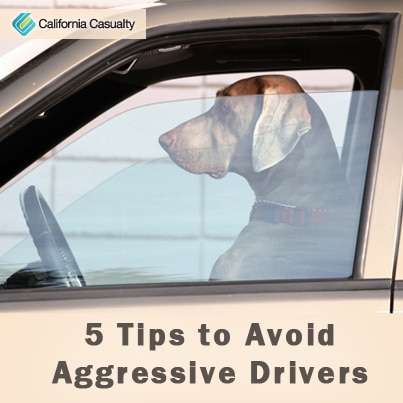
By: Mark Goldberg
I couldn’t believe it (well, then again nothing is that surprising these days) – the guy in the car ahead of me was shaving. It was early morning as we drove on a narrow two-lane road. He swerved numerous times as he continued grooming behind the wheel. It could have ended badly since there were school buses and elementary school children on the side of the road; luckily nobody was hit or hurt. The sad part is that he was oblivious to how dangerous his antics were.
Then, on a recent trip to visit our daughter, my wife and I witnessed drivers passing on the far right on the interstate, wildly veering across three lanes and then back to the left lane. Others were tailgating at such a high speed that there was no way they would avoid slamming into the car ahead if traffic suddenly came to a stop.
We’ve all seen it; people with angry faces, often gesturing, as the careen through our thoroughfares as if they were the only one who mattered. As we encounter the growing number of distracted and aggressive drivers, it got me thinking about how we all need to be hyper-aware and drive with extra precaution.

So, what can you do?
- Stay out of the left lane unless you are passing
- Don’t challenge them by speeding up or trying to block them
- Follow the speed limit
- Avoid eye contact
- Report them to authorities providing vehicle description, license plate number, location and direction of travel
Gesturing back or making eye contact can often lead to road rage.
And here are some defensive driving tips that can help you avoid confrontations with aggressive drivers:
- Keep scanning the area ahead and behind you
- Drive with both hands on the wheel to better respond to dangers
- Wear your seatbelt
- Slow down in bad weather
- Have an escape plan
- Don’t follow too close
- Avoid driving when tired or drowsy
Experts recommend that you take a defensive driving course to learn these techniques; besides it can also qualify you for a discount on your auto insurance.
California Casualty is dedicated to preventing this type of driving behavior. That’s why we are proud to be a major sponsor of Impact Teen Drivers, a nonprofit formed with the law enforcement and education groups that uses peer-to-peer tactics to educate teen and young adults about the dangers of distracted and reckless driving. Learn more at https://www.calcas.com/web/ccmc/impact-teen-drivers.
Before you hit the road, make sure you have adequate protection in case you encounter a distracted or aggressive driver. Call a California Casualty advisor today for an auto policy review or comparison at 1.800.800.9410 or visit www.calcas.com.
Sources for this article:
https://www.nhtsa.gov/people/injury/aggressive/Aggressive%20Web/index.html
https://www.nhtsa.gov/people/injury/enforce/aggdrv.html
https://auto.howstuffworks.com/car-driving-safety/accidents-hazardous-conditions/10-safe-driving-tips.htm#page=9
https://www.distraction.gov/
https://roadragers.com/road-rage-advice.htm
by California Casualty | Safety |
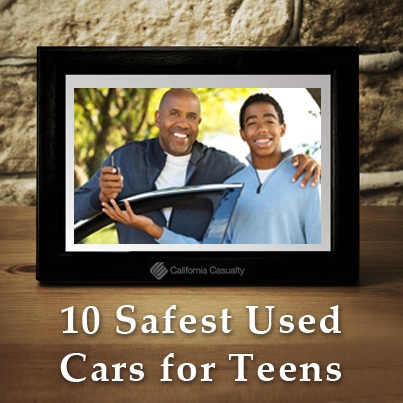
Nothing is more precious than our children. We try and protect them as long as possible, including when they get their first car.
When it comes time for that purchase we want the safest one possible at a good price, but buying solely on price could compromise their safety. Researching safety and price can be an arduous process but Consumer Reports has done the work for you. After looking at vehicles that have electronic stabilization control, good handling and stopping in emergency maneuver tests, and have blue tooth features to discourage using the phone while driving, they came up with this list of the 10 best used cars for teens under $10,000.
- 2009-2012 Chevy Malibu – described as solid, comfortable and safe, starting around $8,100
- 2009-2011 Ford Focus – which they call fun to drive with a good view of the road, starting around $6,000
- 2010-2012 Ford Fusion – bigger and more sophisticated than its smaller cousin with better handling, starting around $8,000
- 2006-2014 Hyundai Sonata – which they described as comfortable and almost luxurious with good gas mileage, starting around $5,200
- 2010-2011 Kia Soul – a boxy vehicle that has lots of room and is considered “hip,” starting around $8,600
- 2011-2013 Mazda3 – safe, fuel efficient and fun to drive, starting around $9,800
- 2009-2013 Mazda6 – a sporty midsized sedan that parents may want to borrow, starting around $8,300
- 2004-2012 Toyota Rav4 – plenty of cargo space and all-wheel drive for inclement weather, starting around $7,300
- 2009-2010 VW Jetta – a sophisticated small car that handles well with good stability, starting around $7,200
- 2009-2014 VW Rabbit/Golf – some of the best selling cars that are still catching on in America with great room and secure handling, starting around $7,700
Most of these vehicles come with a 4 cylinder option, which the Insurance Institute for Highway safety recommends for younger, less skilled drivers.
Here is why safety is such a concern: the Centers for Disease Control and Prevention reports that motor vehicle crashes are the leading cause of injury and death for U.S. teens. The Insurance Institute for Highway Safety has found the risk of these crashes is highest among 16-to-19 year olds than any other age group.
California Casualty also has a commitment to the safety of teen drivers. We’ve partnered with law enforcement agencies, safety groups, educators and concerned parents to create and fund Impact Teen Drivers, an intensive campaign to inform young drivers about the dangers of distracted or reckless driving. The nonprofit provides training and powerful tools to help engage teen drivers and change their attitudes behind the wheel.
California Casualty can also make sure your teen drivers are protected with quality auto insurance. Contact an advisor today to learn about some of the best auto insurance rates for teen drivers, 1.800.800.9410 or visit www.calcas.com.
Sources for this article:
https://www.consumerreports.org/cro/magazine/2015/05/10-great-used-cars-under-10000-dollars/index.htm
https://www.iihs.org/iihs/topics/t/teenagers/topicoverview
https://www.calcas.com/impact-teen-drivers
by California Casualty | Safety |
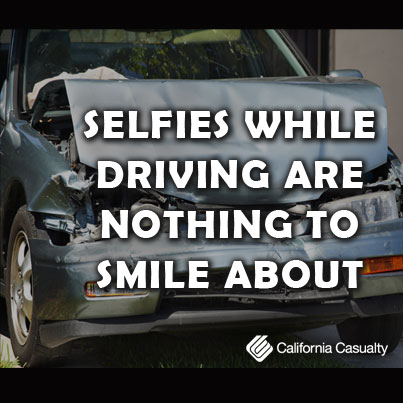
As if texting and driving wasn’t bad enough, a new survey finds drivers are distracted by modern technology in numerous other ways: surfing the Internet, tweeting or taking and sharing a “selfie.”
AT&T talked with more than 2,000 people aged 16-25 across the U.S. who have a smartphone and drive at least once per day. Seventy percent acknowledged using their phone while behind the wheel. While texting and emailing were the most prevalent activities, four-in-ten were tapping into social media while driving and almost three-in-ten said the surf the net. Here is the breakdown of things people admitted they do as drivers:
- 61 percent text
- 33 percent email
- 28 percent surf the net
- 27 percent look at Facebook
- 17 percent snap a selfie
- 14 percent check Twitter or Instagram
Around one-in-ten said they conduct video chats, have shot a video or viewed a Snapchat behind the wheel.
Keep in mind that the average text takes the driver’s eyes off the road for five seconds – if they were driving 55 miles per hour that would equal driving the length of a football field blindfolded.
The Centers for Disease Control and Prevention estimates that every day nine people are killed and more than 1,100 are injured in crashes that involve a distracted driver. Unfortunately, teen drivers are more likely to be distracted and were involved in a disproportionate amount of fatal crashes.
These are more than statistics; they involve real people and impact real families. Sydnee W. was an Ohio teen who died in a crash just shy of her 18th birthday. She was driving distracted and not wearing her seatbelt. Fourteen year old Hunter C. was the victim of a crash where the 17 year old driver was distracted. Connor L. was just 16 when he was hit and killed by a distracted, unlicensed 18 year old driver. None of the families or friends of these teens ever thought their loved one would never come home again.
Many states have now banned the use of a hand-held device behind the wheel, but much more needs to be done. That’s why California Casualty has teamed up with law enforcement agencies and education groups to form Impact Teen Drivers, a non-profit that educates young drivers about the dangers of distracted and careless driving. Much of the effort involves peer-to-peer messages about the problem, including the Create Real Impact contest, awarding prizes to the individuals and schools who produce the most creative video, music, art or essay to prevent distracted driving.
Here are other ways Impact Teen Drivers battles inattentive driving:
- Providing resources to help student leaders fine-tune traffic safety messages they can spread to others
- Developing curriculum for elementary and middle school students focusing on seat belt safety, being a non-distracting passenger and speaking up in unsafe driving situations
- Leading Train the Trainers programs to empower first responders, educators, health professionals and community members so they can deliver high energy, fact based presentations to teens in school and community settings
- Holding parent-teen workshops to discuss graduated drivers licensing laws and sharing the “What Do You Consider Lethal?” campaign
California Casualty urges everyone to put the phone down while driving and talk to their teens about the danger of inattentive driving. Learn more about our commitment at www.calcas.com/impact-teen-drivers.
Resources for this article:
https://about.att.com/story/smartphone_use_while_driving_grows_beyond_texting.html
https://www.cdc.gov/MotorVehicleSafety/Teen_Drivers/teendrivers_factsheet.html
www.impactteendrivers.org
by California Casualty | Safety |
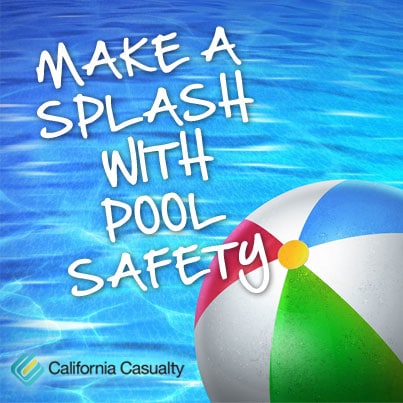
There’s nothing like a cool dip in a pool on a hot summer day, but calm waters can be dangerous for children. The Consumer Protection Safety Commission (CPSC) reports that nearly 400 children under the age of fifteen drown every year in a pool or spa. Unfortunately, the 4th of July traditionally sees an increase in the number of pool and spa drownings.
Teaching kids to swim and maintaining proper supervision are essential in preventing water tragedies. The CPSC has teamed up with USA Swimming for a concerted pool safety campaign. “Pool Safely” offers these top 10 stay safe tips around pools and spas:
- Never leave children unattended near a pool or spa and watch them at all times
- Teach children basic water safety
- If a child is missing look for him or her in the pool or spa first
- Keep kids away from pool drains, pipes and other openings that could trap them
- Make sure any pool or spa you use has drain covers that comply with federal standards
- Lean how to swim and teach your children to swim
- Learn CPR for children and adults
- Install a four-foot or taller fence around the perimeter of pools and spas and use self-closing and self-latching gates – ask your neighbors to do the same if they have pools
- Install and use a locking safety cover on your spa
- Have lifesaving equipment such as life rings, floats and a reaching pole available and easily accessible
Keep in mind that air filled or foam toys are not water safety devices.
Some excellent learn to swim programs can be found at SwimAmerica, your local YMCA or at the American Red Cross.
There are insurance implications for those with pools. Having one is considered an “attractive nuisance,” increasing liability risk. Most companies will require it be completely fenced with a locking gate. Many companies will not cover liability from diving boards or slides, and some companies may disqualify you for homeowner insurance. Because of the increased danger, the Insurance Information Institute says pool owners may want to increase their liability coverage to at least $300,000 or $500,000.
If you have a pool, make sure you have sufficient liability coverage from your homeowner’s insurance. Call a California Casualty advisor today for a policy review, 1.800.800.9410 or visit www.calcas.com.
Sources for this article:
https://www.cpsc.gov/en/Newsroom/News-Releases/2014/A-Call-to-Action-Parents-and-Children-Need-to-Learn-to-Swim-and-Pool-Safely-during-the-July-4th-Holiday/
https://www.poolsafely.gov/
https://www.iii.org/press-release/before-taking-a-dip-in-the-swimming-pool-consider-the-insurance-and-safety-implications-080111
https://www.swimamerica.org/TabGeneric.jsp?_tabid_=47206&team=sa
https://www.ymca.net/swim-sports-play
https://www.redcross.org/take-a-class/program-highlights/swimming
by California Casualty | Safety |
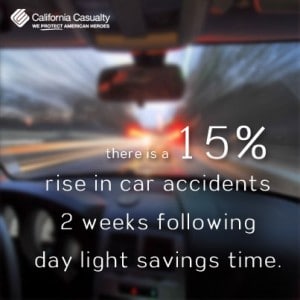
There’s a lot of debate about the spring time change; it’s nice to get more daylight but the effects may not be worth it – kids are tired and cranky and many of us are exhausted from losing the hour of sleep. If you are feeling “out of sorts” the week after the change to Day Light Saving (DST), you are not alone. Many sleep experts say messing with our sleep can cause some real health concerns for the heart and the brain.
A 2012 University of Alabama study confirmed the results of an earlier study in Sweden that found a spike in heart attacks the first week of DST.
Numerous studies have shown a 10 to 15 percent rise in traffic accidents the two weeks following the “spring forward” in time.
Educators
Students appear to be affected too. A 2009 study in the journal Sleep Medicine found that, overall, kids were sleepier than usual during the day for three weeks after the time change. The authors of the study suggested that no tests should be given during the first week or two after the switch to DST.
Shift workers – police officers, firefighters, EMTs and nurses – are not immune either.
Tired Blues for the Men and Women in Blue
A study in the Journal of American Medical Association (JAMA) found 40 percent of law enforcement officers had a sleep disorder and just under half admitted to falling asleep while driving, a quarter of those reported doing so at least one or two times per month. The percentage of drowsy driving increased for officers on night shifts. With Daylight Saving and the loss of a precious hour of sleep, already disjointed sleep patterns can be even more affected. The JAMA study concluded that a sleep deprived mind was found to produce officers with a higher rate of reporting serious administrative errors, making safety violations attributed to fatigue, exhibiting anger, falling asleep while driving or during meetings, and absenteeism.
Fatigued Firefighters and First Responders
A study by the International Association of Fire Chiefs (IAFC) warned that that “sleep deprivation [among firefighters] may be responsible for the disproportionally higher fireground injury rates observed early in the morning hours.” It also showed that fatigue when driving may increase the risk of crashes following work hours. Again, switching to DST appears to exacerbate the problem.
Nodding Nurses
Do you know a nurse who isn’t tired? In a study of hospital staff nurses, almost 600 out of 900 surveyed reported at least one episode of drowsy driving and 30 nurses admitted they experienced fatigued driving following every shift they worked. For nurses who worked only night shifts, the percentage rose to almost 80 percent. For many, the time change only makes the problem worse. A sleep deprived mind is not good for patient care and workplace harmony.
Sleep Tips
Here are some possible solutions from WebMD and the American Academy of Sleep Medicine to relieve the effects of DST:
- Expose yourself to bright light during waking hours and no light at nighttime
- Practice good sleep “hygiene:” limit or reduce caffeine and alcohol, create calming rituals before bed to gradually relax and, exercise several hours before bedtime
- Take low doses of melatonin, a substance that helps regulate cycles of sleep
- Take the Monday after the time change off if you feel too sleepy to work or drive
The good news is that within a few weeks, our bodies and brains begin to adjust to the new sleep schedule.
Don’t Forget the Smoke Detectors
This is also the time to replace the batteries in smoke detectors and carbon monoxide alarms. Fire officials say working smoke and carbon monoxide alarms save lives and protect property.
Get Protection
The switch to Daylight Saving, with more tired drivers on the road, should be a reminder that now is a prudent time for a policy review to make sure you have the right auto and home insurance protection at the best value. Call today and talk to a California Casualty advisor at 1.800.800.9410, or visit www.calcas.com.
Read more about the effects of the spring time change at
https://articles.mercola.com/sites/articles/archive/2013/03/07/dst-change-increases-heart-attack.aspx
https://www.sleepeducation.com/news/2013/03/11/why-accidents-increase-after-spring-forward-to-daylight-savings
https://jama.jamanetwork.com/article.aspx?articleid=1104746&resultClick=3
https://www.iafc.org/sleep
https://www.ncbi.nlm.nih.gov/books/NBK2645/
by California Casualty | Safety |

It happens every fall; as the first frigid Polar air makes its plunge into the U.S., many of us are scrambling to find the hats, gloves and extra layers we put away for summer.
Hopefully you have had your HVAC system checked and replaced the filters for maximum warmth on these cold days. Here are some more simple tips from Wikihow.com to keep you warm while helping you save on the heating bill:
- Warm rooms by opening window shades when the sun is shining
- Hang cheap, clear shower curtains to block cold air while allowing the sun’s heat in
- Close off unused rooms
- Use rugs and carpets over cold floors
- Cooking with the oven adds heat to your home
- Drink hot liquids
- Wear layers
- Exercise
- Snuggle with a pet
- Get a heating pad or electric blanket
Remember, too, that running ceiling fans in reverse pushes warm air down to the ground.
To help keep you safe, the American Red Cross is launching a new campaign to reduce the risk of home fires that usually increase this time of year. The most essential part of the campaign is to have Americans install and check their smoke alarms and for each household to practice fire drills. The Red Cross also urges everyone to follow these common sense heating safety tips:
- Keep ignition sources like paper, clothing, bedding and curtains at least three feet away from space heaters, stoves and fireplaces
- Never leave heaters and fireplaces unattended
- Place space heaters on a level hard surface like tile floors and away from rugs
- Look for models that have automatic shut off features
- Have wood and coal stoves, fireplaces, chimneys and furnaces professionally inspected and cleaned once a year
Now is also a great time to make sure your family has an emergency kit. According to Ready.gov, it should have enough food and water to survive for a minimum of three days and should also contain:
- A battery powered radio
- Flashlight
- Lots of extra batteries
- First aid kit
- Formula and diapers if you have an infant
- Moist towelettes, garbage bags and plastic ties for sanitation
- Plastic sheeting and duct tape to shelter in place
- Wrench or pliers to turn on and off utilities
- A can opener
- Any essential medications
- Household chlorine bleach to disinfect and treat water
You can find numerous other winter safety preparations and tips at the California Casualty Resources Page. And don’t forget to make sure your vehicle is ready for winter too.
Now is a really good time to make sure your home or apartment is fully protected for fire, ice, wind and other winter damage. Call a California Casualty advisor today for a policy review and to see what discounts you qualify for at 1.800.800.9410 or at www.calcas.com.
Sources for this article:
https://www.wikihow.com/Stay-Warm-at-Home-Without-a-Heater
https://www.redcross.org/prepare/location/home-family/prevent-home-fires/
https://www.ready.gov/build-a-kit
https://mycalcas.com/2012/11/preparing-your-car-for-winter/







